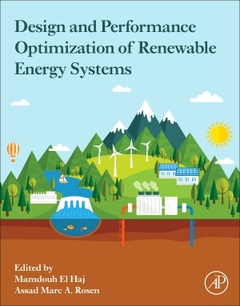Description
Design and Performance Optimization of Renewable Energy Systems
Coordinators: Assad Mamdouh, A Rosen Marc
Language: English
Subject for Design and Performance Optimization of Renewable Energy...:
Keywords
Solar; Geothermal; Wind; Hydro; Heat pumps; Exergy; Neural network analysis; Nanofluids; Optimization; Fuel cell; PV
318 p. · 21.4x27.6 cm · Paperback
Description
/li>Contents
/li>Biography
/li>Comment
/li>
Design and Performance Optimization of Renewable Energy Systems provides an integrated discussion of issues relating to renewable energy performance design and optimization using advanced thermodynamic analysis with modern methods to configure major renewable energy plant configurations (solar, geothermal, wind, hydro, PV). Vectors of performance enhancement reviewed include thermodynamics, heat transfer, exergoeconomics and neural network techniques. Source technologies studied range across geothermal power plants, hydroelectric power, solar power towers, linear concentrating PV, parabolic trough solar collectors, grid-tied hybrid solar PV/Fuel cell for freshwater production, and wind energy systems. Finally, nanofluids in renewable energy systems are reviewed and discussed from the heat transfer enhancement perspective.
1. Introduction 2. Heat exchangers and nanofluids 3. Exergy analysis 4. Optimization techniques for solar energy applications 5. Solar power tower systems 6. Parabolic trough solar collectors 7. Solar water heaters 8. Performance of PV systems 9. Linear concentrating photovoltaic system 10. Hybrid solar PV/fuel cell power system 11. Geothermal power plants 12. ORC as waste heat recovery system 13. Wind turbines 14. Hydropower 15. Heat pumps 16. Energy storage 17. Neural network analysis in renewable energy systems
Academic Degrees
B.Sc Mechanical Engineering, Middle East Technical University, Ankara, Turkey
M.Sc Nuclear Engineering, Middle East Technical University, Ankara, Turkey
PhD Mechanical Engineering, Aalto University, Espoo, Finland
Marc A. Rosen is a professor at Ontario Tech University (formally University of Ontario Institute of Technology) in Oshawa, Canada, where he served as founding Dean of the Faculty of Engineering and Applied Science. He is also the Editor-in-Chief of the International Journal of Energy and Environmental Engineering and the founding Editor-in-Chief of Sustainability. He has written numerous books and journal articles. Professor Rosen received the President's Award from the Canadian Society for Mechanical Engineering in 2012. He is an active teacher and researcher in sustainable energy, environmental impact of energy and industrial systems, and energy technology (including heat transfer and recovery, renewable energy and efficiency improvement). His work on exergy methods in applied thermo
- Reviews the fundamentals of thermodynamics and heat transfer concepts to help engineers overcome design challenges for performance maximization
- Explores advanced design and operating principles for solar, geothermal and wind energy systems with diagrams and examples
- Combines detailed mathematical modeling with relevant computational analyses, focusing on novel techniques such as artificial neural network analyses
- Demonstrates how to maximize overall system performance by achieving synergies in equipment and component efficiency
These books may interest you

Renewable Energy System Design 108.13 €



